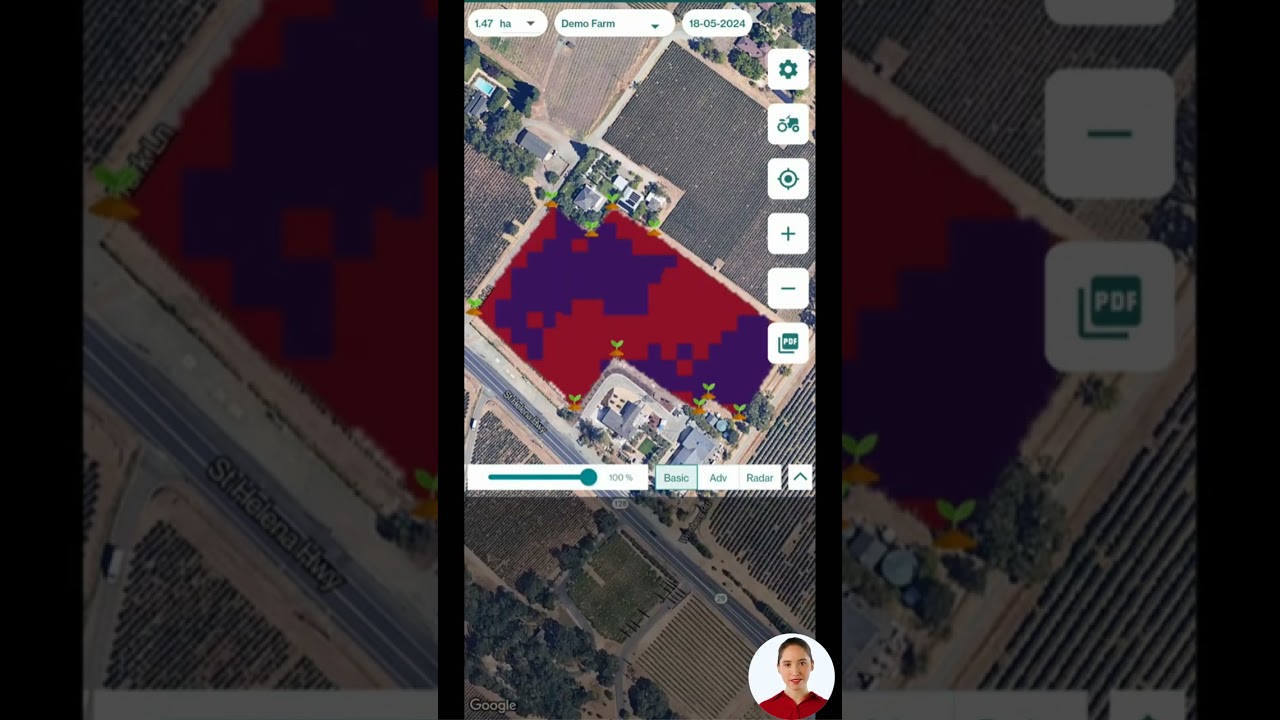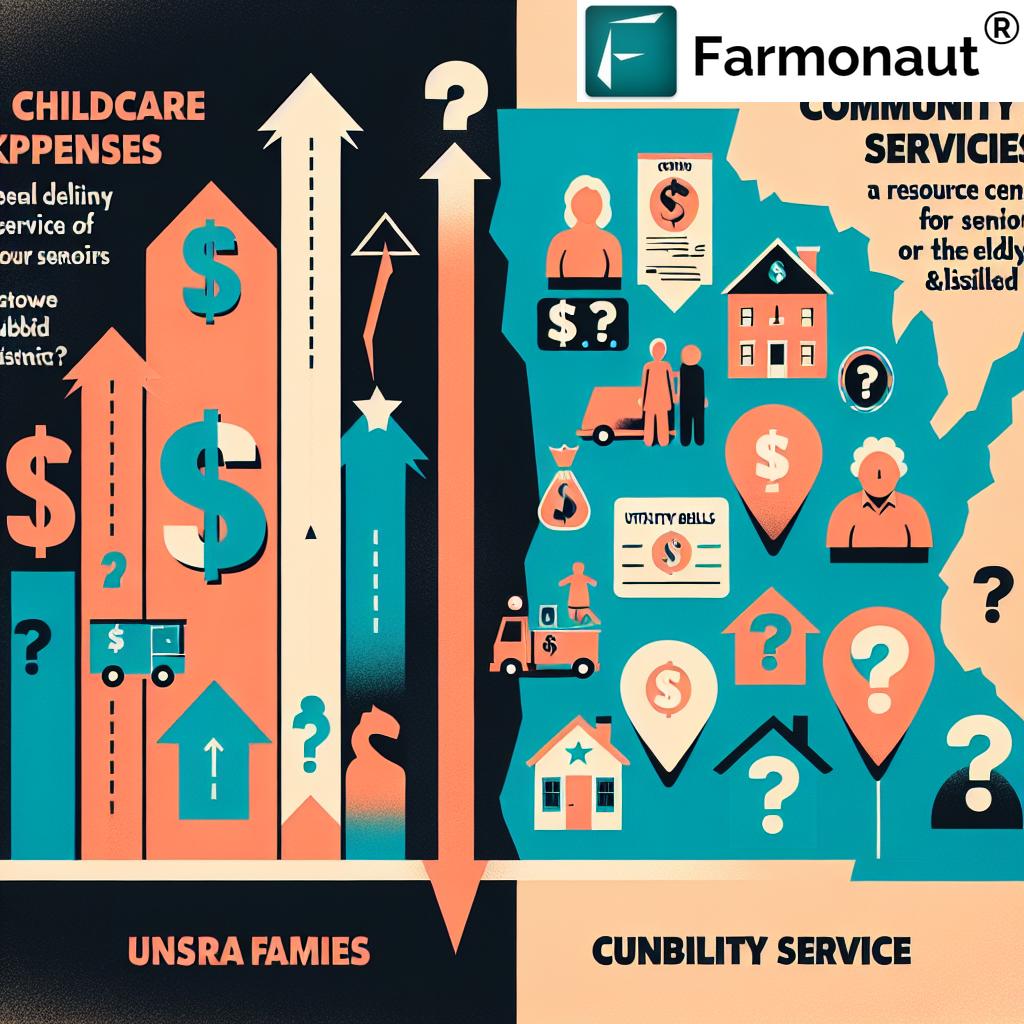Missouri’s Water Privacy Bill: Balancing Agricultural Rights and Public Transparency
“Missouri’s water privacy bill could affect reporting for over 12,000 major water users in the state.”
In the heart of America’s agricultural heartland, a contentious debate is unfolding that pits the privacy rights of farmers against the public’s right to access information about water usage. We at Farmonaut, as providers of advanced satellite-based farm management solutions, are closely monitoring this situation and its potential implications for the agricultural sector. The Missouri water bill and its intersection with the state’s Sunshine Law have become the focal point of a heated discussion about agricultural water usage and privacy in the Show-Me State.
Understanding the Missouri Water Bill
The proposed legislation in Missouri aims to exempt major water users, particularly those in the agricultural sector, from disclosing certain information publicly. This bill, if passed, would create a significant exception to Missouri’s Sunshine Law, which has long been a cornerstone of governmental transparency in the state.
Let’s break down the key components of this proposed water privacy law:
- It defines a major water user as “any person or entity with the capability of producing 100,000 gallons per day, or approximately 70 gallons per minute, including all wells or surface intakes.”
- The bill would keep confidential information about these major water users, specifically for entities directing water to agricultural land.
- Information that would be protected includes personal data like names and addresses, as well as details about water sources, usage amounts, and water destinations.
This legislation has garnered strong support from agricultural industry groups, including the Missouri Soybean Association, the Missouri Corn Growers Association, and the Missouri Farm Bureau. These organizations argue that the bill is necessary to protect farmers’ privacy and prevent potential harassment.
The Current State of Water Reporting in Missouri
Under the existing Missouri Sunshine Law, major water users are required to register with the state if they divert water from a significant water source. This registration process includes providing personal information as well as details about water usage. The current system aims to ensure transparency and accountability in water resource management.
Here’s what the current registration process entails:
- Applicant’s name and address
- Location and type of water source
- Amount of water to be used
- Intended destination of the water
This information has been publicly accessible, allowing for oversight and analysis of water usage patterns across the state. However, the proposed bill would significantly alter this landscape of transparency.
The Push for Privacy: Arguments in Favor of the Bill
Supporters of the Missouri water bill, including State Sen. Mike Henderson (R-Desloge), argue that it’s primarily about protecting farmers’ privacy. “We just want to make sure that their privacy is protected, that their cell phone number isn’t out there for people to try to harass them,” Henderson stated.
The agricultural industry has rallied behind this legislation, citing several reasons:
- Protection of personally identifiable information
- Prevention of potential harassment or targeting of farmers
- Safeguarding of proprietary farming practices
- Maintaining competitive advantage in the agricultural sector
Jacob Knaebel, a lobbyist with the Missouri Corn Growers Association, emphasized the importance of protecting farmers’ information, especially when they are compelled by law to report their usage.

Concerns Over Transparency: The Opposition’s Stance
Despite the strong support from agricultural groups, the bill has faced opposition from public information advocates and environmental organizations. These groups worry about the potential loss of transparency in water resource management, a critical issue in a state where agriculture plays a pivotal role in the economy and environment.
Key concerns raised by opponents include:
- Reduction in public access to crucial information about water usage
- Potential impact on environmental monitoring and conservation efforts
- Erosion of the principles underlying the Missouri Sunshine Law
- Difficulties in holding major water users accountable
Mike Jenner, former Columbia Missourian editor and faculty member at the Missouri School of Journalism, voiced opposition on behalf of the Missouri Press Association. He argued, “I can’t think of a resource in the state that’s of greater public interest than water. I think there’s great concern about who uses water, especially who the mega-users are.”
“The proposed legislation in Missouri aims to protect privacy for farmers who collectively use billions of gallons annually.”
Balancing Act: Privacy vs. Public Interest
The debate surrounding the Missouri water bill highlights the delicate balance between protecting individual privacy and maintaining public transparency. It’s a complex issue that touches on several key areas:
- Water resource management
- Agricultural rights
- Environmental stewardship
- Government transparency
- Public right to information
As providers of advanced agricultural technology solutions, we at Farmonaut understand the importance of data privacy. Our satellite-based crop health monitoring and AI advisory systems rely on secure data handling to provide valuable insights to farmers. However, we also recognize the critical role that transparency plays in sustainable water management.
Potential Impacts on Missouri’s Water Management
If passed, the Missouri water bill could have far-reaching implications for water resource management in the state. Here are some potential impacts:
- Reduced public oversight of major water users
- Changes in irrigation regulations and enforcement
- Potential shifts in farm water rights
- Alterations to environmental monitoring processes
- Adjustments in water conservation strategies
While the bill’s supporters argue that aggregate data will still be available at the county level, critics worry that this may not be sufficient for effective water resource management and environmental protection.
The Role of Technology in Modern Agriculture
As this debate unfolds, it’s important to consider the role that technology plays in modern agriculture. Advanced solutions like those offered by Farmonaut can help farmers optimize their water usage through precise monitoring and AI-driven insights. Our satellite-based crop health monitoring system, for instance, provides valuable data on soil moisture levels, helping farmers make informed decisions about irrigation.
Here are some ways technology can contribute to efficient water management:
- Real-time monitoring of crop health and soil moisture
- AI-powered irrigation recommendations
- Weather forecasting for optimal water usage planning
- Data-driven insights for sustainable farming practices
By leveraging these technologies, farmers can potentially reduce their water consumption while maintaining or even improving crop yields. This could help address some of the concerns about water usage transparency by demonstrating responsible stewardship of this vital resource.

Comparative Analysis: Current Law vs. Proposed Changes
| Aspect of Water Usage | Current Sunshine Law Requirements | Proposed Changes | Potential Impact on Farmers | Concerns Raised by Critics |
|---|---|---|---|---|
| Water diversion reporting | Public disclosure required | Confidential for agricultural users | Increased privacy protection | Loss of public oversight |
| Public access to water usage data | Fully accessible | Limited to aggregate county-level data | Reduced risk of targeting or harassment | Difficulty in assessing individual impact |
| Protection of personal information | Limited protection | Enhanced protection for farmers | Greater privacy and security | Potential for reduced accountability |
| Irrigation regulations | Transparent enforcement | Potentially less transparent enforcement | More flexibility in water management | Possible overuse of water resources |
| Farm water rights | Publicly verifiable | Less public scrutiny | Increased control over water usage information | Potential for inequitable distribution |
The Broader Context: Water Management in Agriculture
The Missouri water bill debate is part of a larger conversation about water management in agriculture. As climate change continues to impact weather patterns and water availability, efficient use of water resources becomes increasingly critical. This is where technologies like those offered by Farmonaut can play a crucial role.
Our satellite-based monitoring and AI advisory systems help farmers:
- Optimize irrigation schedules
- Detect early signs of water stress in crops
- Make data-driven decisions about water usage
- Implement sustainable farming practices
By providing these tools, we aim to support both agricultural productivity and environmental sustainability. Regardless of the outcome of the Missouri water bill, farmers can benefit from adopting these advanced technologies to improve their water management practices.
The Future of Water Transparency in Missouri
As the debate over the Missouri water bill continues, it’s clear that finding a balance between privacy and transparency will be crucial. The outcome of this legislative session could set a precedent for how water usage information is handled not just in Missouri, but potentially in other agricultural states as well.
Some potential future scenarios include:
- Implementation of more sophisticated data anonymization techniques
- Development of new technologies for public water usage monitoring
- Creation of industry-led transparency initiatives
- Establishment of third-party oversight mechanisms
Regardless of the legislative outcome, the importance of responsible water management in agriculture will only continue to grow. At Farmonaut, we remain committed to providing farmers with the tools they need to optimize their water usage while respecting privacy concerns.
The Role of Farmonaut in Sustainable Agriculture
As discussions about water usage and transparency continue, it’s worth highlighting how technology can contribute to sustainable agricultural practices. Farmonaut’s suite of tools offers farmers the ability to make data-driven decisions that can lead to more efficient water use without compromising privacy.
Our key offerings include:
- Satellite-Based Crop Health Monitoring: Providing real-time insights into vegetation health and soil moisture levels.
- AI Advisory System: Offering personalized recommendations for optimal resource management.
- Weather Forecasting: Helping farmers plan irrigation and other water-dependent activities more effectively.
- Carbon Footprint Tracking: Assisting agribusinesses in monitoring and reducing their environmental impact.
By leveraging these technologies, farmers can demonstrate their commitment to responsible water management, potentially addressing some of the concerns raised in the Missouri water bill debate.
Looking Ahead: The Intersection of Policy and Technology
As we move forward, it’s clear that the intersection of agricultural policy and technology will play a crucial role in shaping the future of water management. The Missouri water bill debate highlights the need for innovative solutions that can balance privacy concerns with the public interest in transparent resource management.
Some potential developments we might see include:
- Integration of blockchain technology for secure, anonymized water usage reporting
- Development of AI-powered predictive models for water resource management
- Increased adoption of precision agriculture techniques to optimize water use
- Collaboration between tech companies and policymakers to create data-sharing frameworks
At Farmonaut, we’re committed to staying at the forefront of these developments, continually improving our offerings to help farmers navigate the complex landscape of modern agriculture.
Conclusion: Striking a Balance
The Missouri water privacy bill represents a critical juncture in the ongoing dialogue between agricultural rights and public transparency. As we’ve explored, there are valid concerns on both sides of the debate. Farmers have legitimate privacy concerns, while environmental groups and public information advocates worry about the potential loss of oversight.
Moving forward, it will be crucial to find solutions that address both sets of concerns. This may involve:
- Developing more nuanced privacy protections that still allow for meaningful public oversight
- Leveraging technology to provide anonymized, aggregated data that serves the public interest without compromising individual privacy
- Creating forums for ongoing dialogue between farmers, environmental groups, and policymakers
- Investing in education and outreach to help the public understand the complexities of agricultural water use
As providers of advanced agricultural technology, we at Farmonaut are committed to supporting solutions that promote both efficient water use and respect for farmers’ privacy. By continuing to innovate and collaborate, we believe it’s possible to strike a balance that serves the needs of all stakeholders in Missouri’s agricultural future.
FAQs
- What is the Missouri water bill?
The Missouri water bill is proposed legislation that would exempt major water users, particularly those in agriculture, from disclosing certain information publicly. - How does the bill define a major water user?
A major water user is defined as any person or entity capable of producing 100,000 gallons per day, or approximately 70 gallons per minute, including all wells or surface intakes. - What information would be kept confidential under the new bill?
Personal information like names and addresses, as well as details about water sources, usage amounts, and water destinations for agricultural users. - Who supports the Missouri water bill?
The bill is supported by agricultural industry groups such as the Missouri Soybean Association, Missouri Corn Growers Association, and Missouri Farm Bureau. - Who opposes the Missouri water bill?
The bill faces opposition from public information advocates, environmental organizations, and groups like the Missouri Press Association.
Earn With Farmonaut: Affiliate Program
Earn 20% recurring commission with Farmonaut’s affiliate program by sharing your promo code and helping farmers save 10%. Onboard 10 Elite farmers monthly to earn a minimum of $148,000 annually—start now and grow your income!
For more information about Farmonaut’s services, please visit our web app, check out our API, or review our API Developer Docs.
Download our mobile apps:

















